Limited Time Offer!
For Less Than the Cost of a Starbucks Coffee, Access All DevOpsSchool Videos on YouTube Unlimitedly.
Master DevOps, SRE, DevSecOps Skills!
Introduction to Jaisalmer
Overview of the city
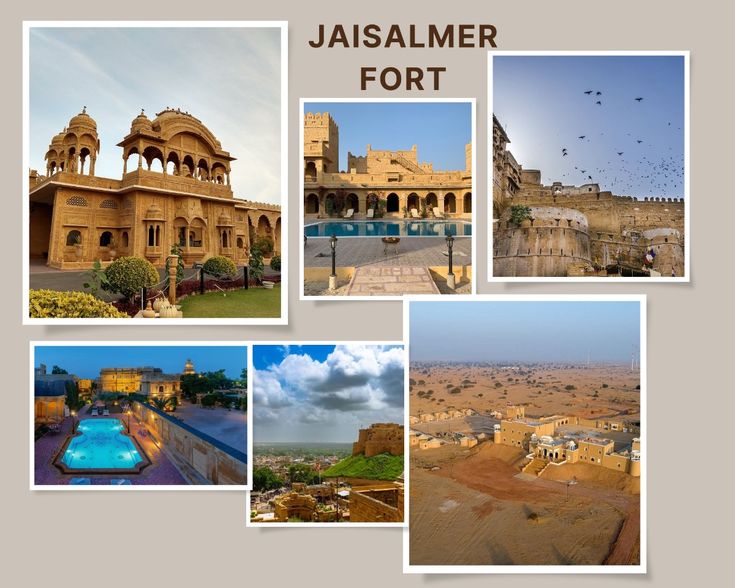
Jaisalmer is situated in the heart of the Thar Desert in Rajasthan, India. Its landscape is characterized by vast sand dunes, rugged terrain, and stunning sunsets. The city is a popular tourist destination, attracting visitors with its splendid architecture, vibrant culture, and adventurous desert activities. Key attractions include the majestic Jaisalmer Fort, intricate havelis like Patwon Ki Haveli, and serene spots like Gadisar Lake. Jaisalmer’s cultural heritage is celebrated through its festivals, traditional music, dance, and local crafts.
Brief history and significance
Jaisalmer, known as the ‘Golden City,’ was founded in 1156 AD by Rawal Jaisal. This historic city is renowned for its yellow sandstone architecture, which gives it a unique golden hue. The city’s strategic location on the camel trade routes made it a prosperous and significant trading center in ancient times. Jaisalmer’s rich history is reflected in its magnificent forts, palaces, and havelis, offering a glimpse into its glorious past.
How to Get There
Travel to Jaisalmer from Major Indian Cities
| From City | Mode of Travel | Details | Travel Time | Approximate Cost |
|---|---|---|---|---|
| Delhi | Air | Direct flight to Jaisalmer | 1.5 hours | Starting around INR 3,500 |
| Mumbai | Air + Road/Train | No direct flights, connect via Jodhpur | Varies | From INR 5,000 upwards |
| Delhi | Train | Runicha Express | Approximately 19 hours | Sleeper: ~INR 500, AC 3-tier: ~INR 1,300, AC 2-tier: ~INR 1,900, AC 1st Class: ~INR 3,200 |
| Delhi | Road | Driving | Approximately 14 hours | Fuel: INR 5,500 – 7,000, Bus: From INR 1,200 (sleeper buses) |
| Jaipur | Road | Driving | About 9-10 hours | Fuel: INR 4,000 – 5,000, Bus: From INR 800 (AC coaches) |
| Jodhpur | Road | Driving | About 4.5-5 hours | Fuel: INR 2,000 – 2,500, Bus: INR 300 – 500 |
| Bangalore | Air + Road/Train | No direct flights, connect via Delhi or Ahmedabad | Varies | Flight costs vary; combined travel starts from INR 7,000 upwards |
| Kolkata | Air + Road/Train | No direct flights, connect via Delhi or Ahmedabad | Varies | Flight costs vary; combined travel starts from INR 6,500 upwards |
| Ahmedabad | Road | Driving | About 9-10 hours | Fuel: INR 3,500 – 4,500, Bus: From INR 600 (AC coaches) |
| Lucknow | Air + Road/Train | No direct flights, connect via Delhi | Varies | Flight costs vary; combined travel starts from INR 5,500 upwards |
Travel to Jaisalmer from International Locations
| From Country | Nearest International Hub | Mode of Travel to Jaisalmer | Details | Travel Time | Approximate Cost |
|---|---|---|---|---|---|
| USA | Delhi | Air + Road/Train | Fly to Delhi, then connect via domestic flight/train or road to Jaisalmer | ~20-24 hours total | Varies widely, generally starting from USD 700 (flight to Delhi) |
| UK | Delhi | Air + Road/Train | Fly to Delhi, then connect via domestic flight/train or road to Jaisalmer | ~12-15 hours total | Varies widely, generally starting from GBP 500 (flight to Delhi) |
| Australia | Delhi | Air + Road/Train | Fly to Delhi, then connect via domestic flight/train or road to Jaisalmer | ~15-20 hours total | Starting around AUD 1,000 (flight to Delhi) |
| Canada | Delhi | Air + Road/Train | Fly to Delhi, then connect via domestic flight/train or road to Jaisalmer | ~18-22 hours total | Starting from CAD 900 (flight to Delhi) |
| Germany | Delhi | Air + Road/Train | Fly to Delhi, then connect via domestic flight/train or road to Jaisalmer | ~10-14 hours total | Varies, starting around EUR 600 (flight to Delhi) |
| Singapore | Delhi | Air + Road/Train | Direct flight to Delhi, then connect to Jaisalmer | ~10-12 hours total | Starting around SGD 500 (flight to Delhi) |
| UAE | Delhi | Air + Road/Train | Fly to Delhi, then connect via domestic flight/train or road to Jaisalmer | ~6-8 hours total | From AED 1,000 (flight to Delhi) |
Best Time to Visit
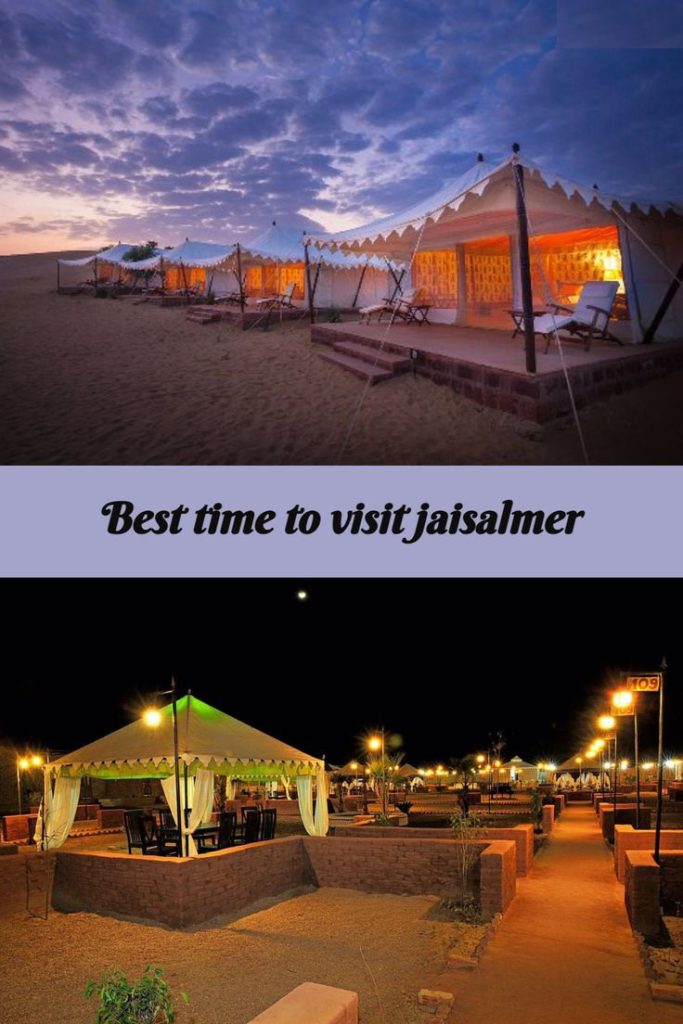
The best time to visit Jaisalmer is between October and March, when the scorching desert heat subsides and the weather becomes pleasant. Here’s a breakdown of Jaisalmer’s climate and the recommended visiting seasons:
Climate Overview
Jaisalmer, located in the heart of the Thar Desert, experiences extreme weather conditions. It has a hot arid climate with very hot summers, short monsoons, and pleasant winters.
- Summers (April-June): Summers in Jaisalmer are scorching hot, with temperatures reaching up to 45°C (113°F). Sandstorms are common during this time, making sightseeing and outdoor activities difficult.
- Monsoons (July-September): The monsoon season in Jaisalmer is short and erratic, with very little rainfall. However, the stark desert landscape comes alive with a touch of green during this time. Temperatures are moderate, ranging between 26°C to 36°C (79°F to 97°F), but humidity can be high.
- Winters (October-March): Winters are the most enjoyable time to visit Jaisalmer. The days are warm and sunny, with temperatures ranging from a comfortable 10°C to 27°C (50°F to 81°F). Evenings and nights can get chilly, so pack some warm clothes. This is the perfect season for exploring the city, the Thar Desert, and all the outdoor activities Jaisalmer has to offer.
Recommended visiting seasons
- October to February: This is the peak tourist season in Jaisalmer, with ideal weather for sightseeing, camel safaris, and exploring the desert. Expect crowds and higher prices during this time
- .March: If you can tolerate slightly warmer temperatures, March can be a good shoulder season to visit Jaisalmer. The crowds are smaller, and you can find good deals on hotels.
- September-October: The monsoon season (September-October) can be a good time to visit Jaisalmer if you’re on a budget and don’t mind the occasional rain shower. The city is less crowded, and the desert landscape has a unique charm. However, some outdoor activities might be unavailable, and humidity can be a bother.
Top Attractions
Jaisalmer, the “Golden City,” is a popular tourist destination in Rajasthan, India. Here are some of the must-visit attractions in
Jaisalmer Fort– Towering over the city on a golden sandstone hill, Jaisalmer Fort is the crown jewel of the Thar Desert. This UNESCO World Heritage Site is one of the largest forts in Rajasthan and is still a living fort with residents inside. You can explore its palaces, temples, and ramparts, and get stunning views of the Jaisalmer cityscape.
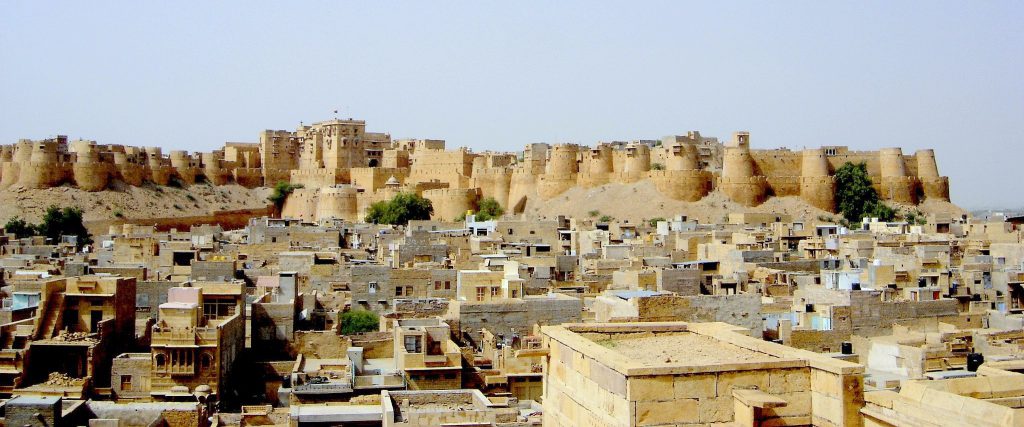
Patwon Ki Haveli – This extravagant cluster of five interconnected mansions is considered one of the most elaborately carved havelis in Jaisalmer. Built by a wealthy merchant family in the 19th century, Patwon Ki Haveli is a masterpiece of Rajput architecture with intricate carvings, latticed windows, and exquisite courtyards.
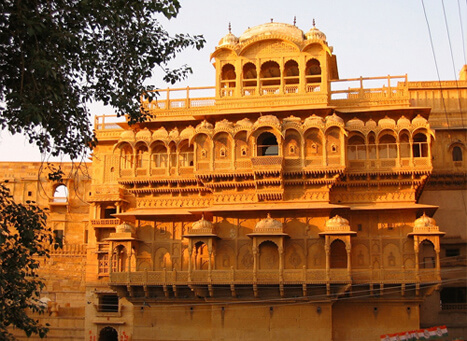
Salim Singh Ki Haveli– Another architectural marvel, Salim Singh Ki Haveli is known for its unique craftsmanship and beautiful symmetry. This 19th-century mansion is built with yellow sandstone and features 38 exquisitely carved balconies, each unique in design.
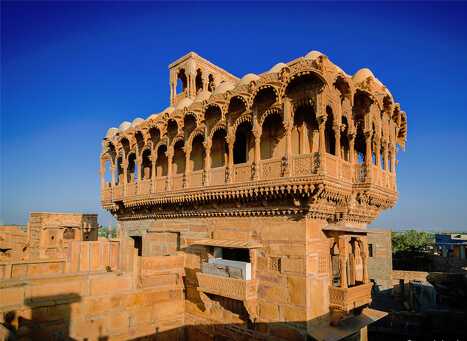
Nathmal Ki Haveli– A privately owned haveli, Nathmal Ki Haveli is famous for its ornate carvings and architectural style. The haveli is said to have been built from two directions and supposedly took over 100 years to complete. A large elephant statue welcomes visitors to this haveli, which is a showcase of intricate latticework and haveli architecture.
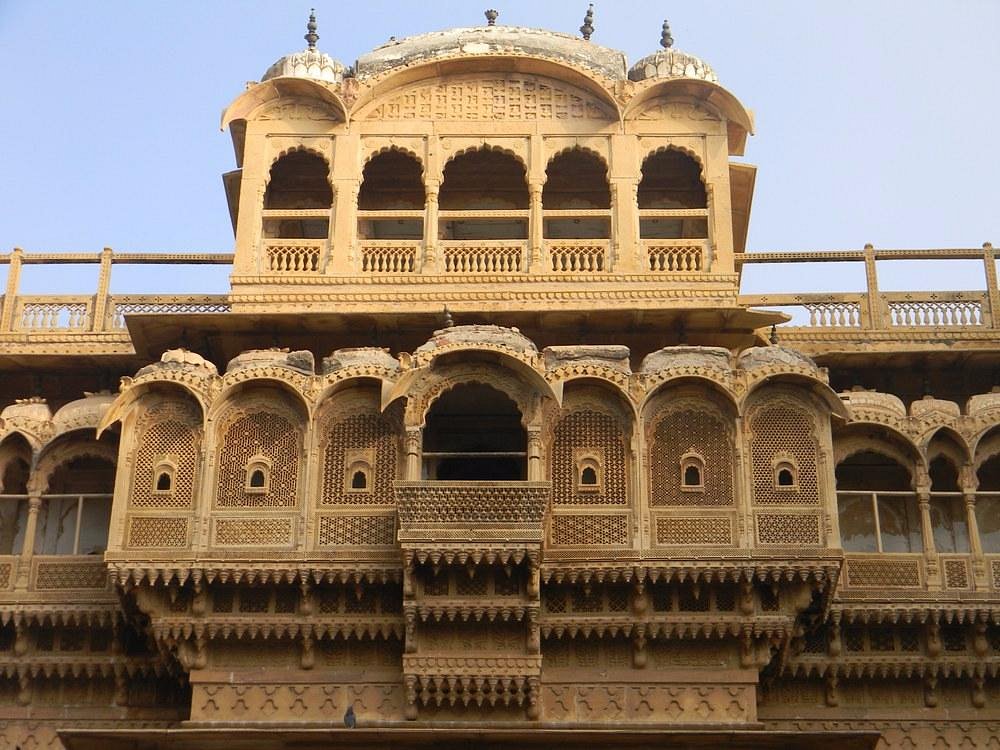
Gadisar Lake – An artificial lake built in the 12th century, Gadisar Lake was the primary source of water for the city of Jaisalmer. Today, the lake is a popular spot for boating, birdwatching, and enjoying scenic walks. The surrounding area has several temples and shrines, making it a place of cultural and historical significance.
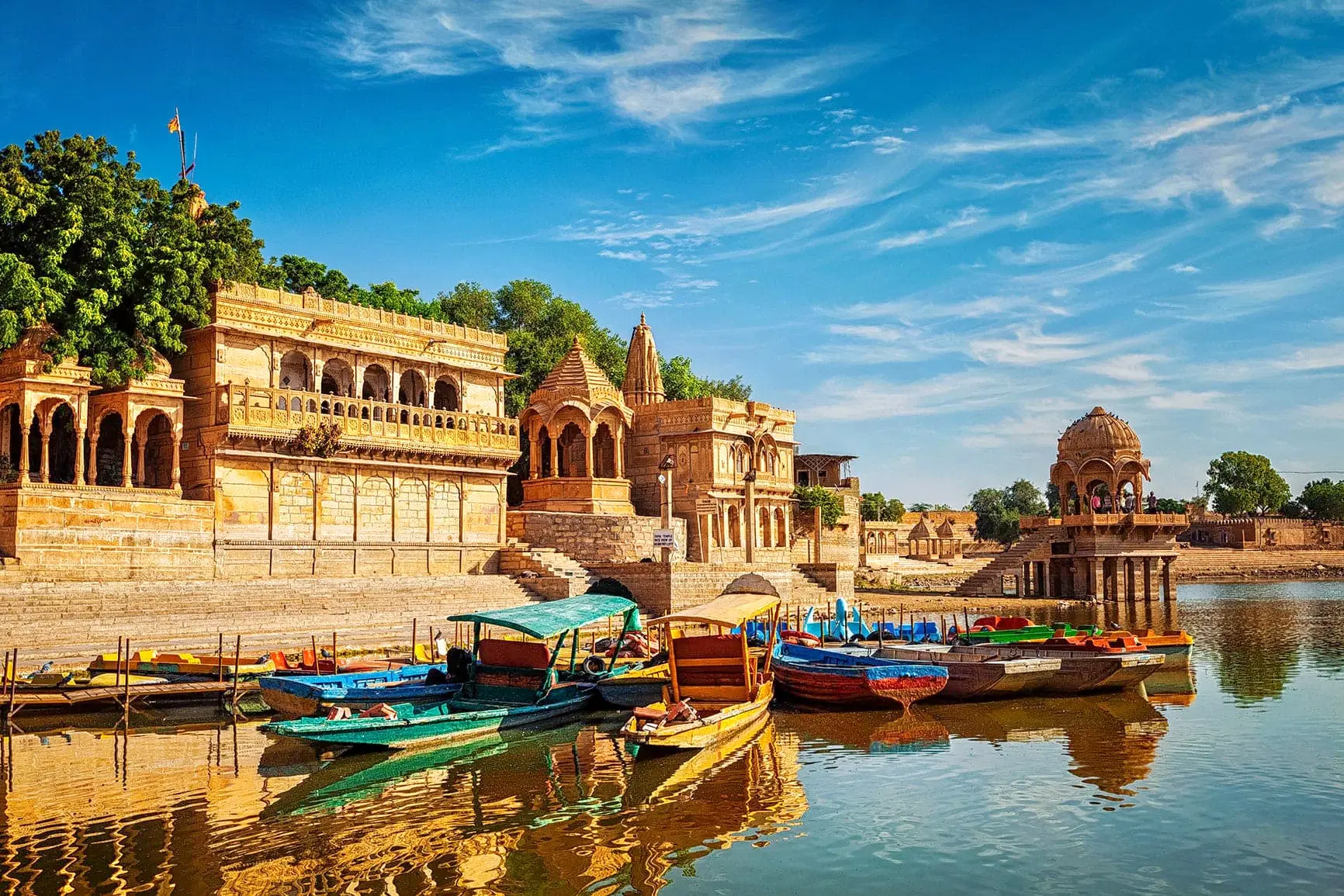
Jain Temples– Jaisalmer is renowned for its beautiful Jain temples, architectural gems adorned with intricate carvings and delicate sculptures. There are seven Jain temples located within the fort, each with a unique design and dedicated to different Jain Tirthankaras (religious figures). The most visited Jain temples are the Chandraprabha Temple and the Shwetambarprabhu Temple.
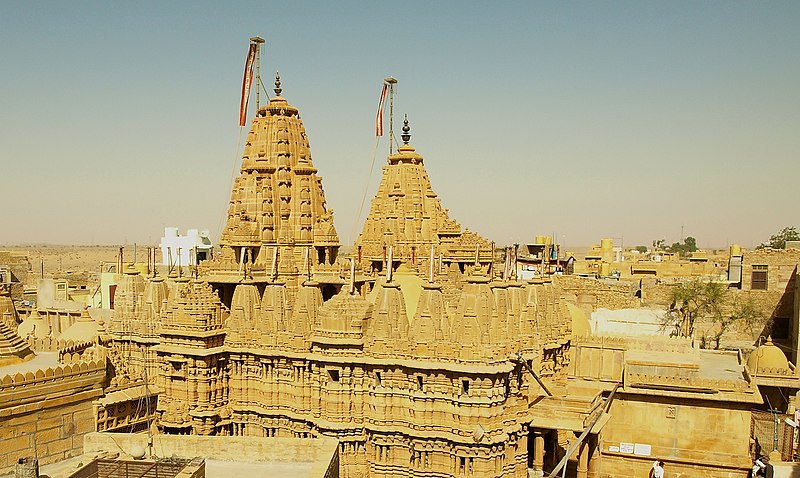
Cultural Highlights
Jaisalmer, known as the “Golden City,” is not only famous for its stunning fortresses and expansive deserts but also for its vibrant culture. From local festivals and traditional arts to unique handicrafts, Jaisalmer offers a rich tapestry of cultural experiences that attract tourists from all over the world.
Local Festivals and Events
- Desert Festival:
- When: Usually held in February
- What to Expect: The Desert Festival is perhaps the most colorful and vibrant celebration in Jaisalmer, showcasing the cultural heritage of Rajasthan. The festival features camel races, turban tying competitions, and folk dance performances. It’s a spectacle of colors, music, and festivity that encapsulates the spirit of the Rajasthani culture.
- Ramdevra Fair:
- When: August to September
- What to Expect: This popular event is held at Ramdevra Village, near Jaisalmer, where devotees flock to pay homage at the shrine of Baba Ramdevji, a folk deity of Rajasthan. The fair is marked by singing, dancing, and the vibrant display of local customs.
- Teej Festival:
- When: July/August
- What to Expect: Teej Festival is celebrated with great enthusiasm in Jaisalmer. Women dress in colorful attire and participate in processions, while folk songs and dances add to the festive mood, celebrating the bounty of nature, family values, and the beauty of the region.
Traditional Music and Dance
- Manganiyar and Kalbeliya Performances:
- Cultural Insight: Manganiyar and Kalbeliya are two of the most renowned musical and dance communities in Rajasthan. The Manganiyar musicians create enchanting melodies with instruments like the kamayacha, while the Kalbeliya dance, often called the “snake charmer” dance, is recognized by UNESCO for its cultural significance.
- Folk Music and Instruments:
- Cultural Insight: Traditional instruments such as the sarangi, morchang, and dholak are commonly used. Folk music often tells tales of heroes, historical battles, and the harsh desert life, encapsulating the essence of Rajasthan’s history.
Handicrafts and Souvenirs
- Jaisalmer Stone Carving:
- Specialty: Jaisalmer is famous for its intricately carved yellow sandstone used in architecture and sculptures. Miniature statues and decorative items made from this stone make for perfect souvenirs.
- Embroidery and Textiles:
- Specialty: Local artisans produce beautiful embroidered fabrics, including shawls, bedspreads, and apparel. The vibrant colors and patterns reflect the local taste and traditions.
- Leather Craft:
- Specialty: Jaisalmer is also known for its high-quality leather products, which include bags, belts, and traditional Mojari shoes. These items are crafted using traditional methods passed down through generations.
Accommodation
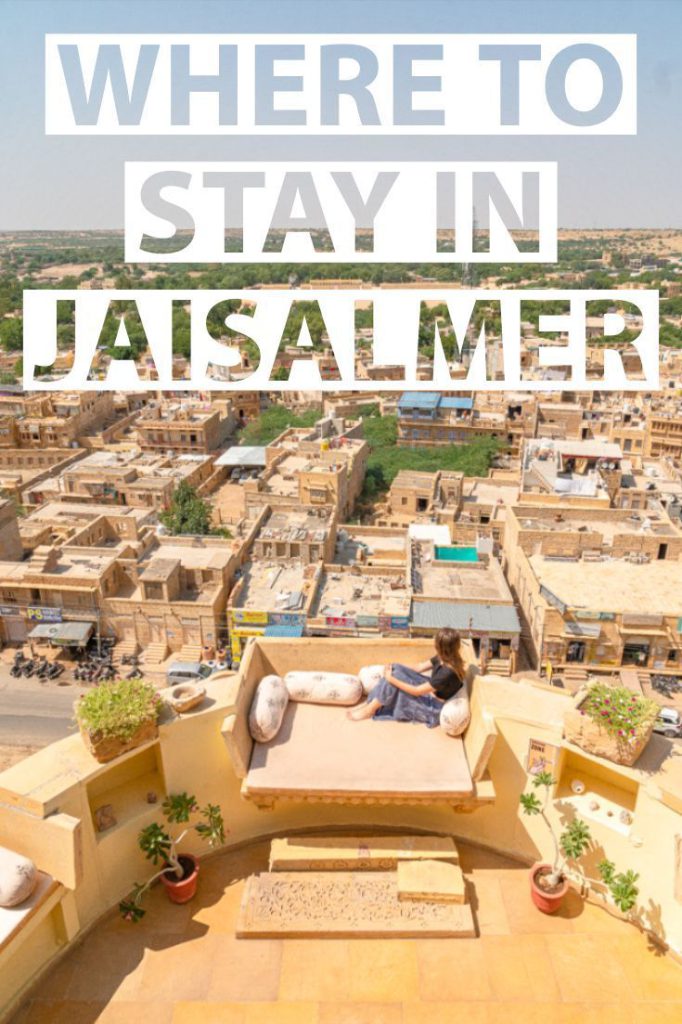
Luxury Hotels
- Suryagarh Jaisalmer:
- Description: An exemplar of luxury in the desert, combining traditional architecture with modern amenities.
- Features: Spa, indoor pool, fine dining restaurants, cultural performances.
- Price Range: Approximately INR 15,000 – 30,000 per night.
- Website: Suryagarh Jaisalmer
- Jaisalmer Marriott Resort & Spa:
- Description: Five-star luxury with elegantly furnished rooms and comprehensive facilities.
- Features: Fitness center, spa, swimming pool, multiple dining options.
- Price Range: Approximately INR 10,000 – 20,000 per night.
- Website: Jaisalmer Marriott Resort & Spa
Budget Hotels
- Hotel Pleasant Haveli:
- Description: Budget-friendly with clean, comfortable rooms in a central location.
- Features: Rooftop restaurant, city views, free Wi-Fi.
- Price Range: Approximately INR 2,000 – 3,500 per night.
- Website: Hotel Pleasant Haveli
- Mystic Jaisalmer Hotel:
- Description: Known for its warm hospitality and affordable rates.
- Features: Desert safaris, rooftop cafe, travel assistance.
- Price Range: Approximately INR 1,500 – 2,500 per night.
- Website: Mystic Jaisalmer
Heritage Stays
- Narayan Niwas Palace:
- Description: A 19th-century palace offering a taste of royal living.
- Features: Rajasthani cuisine, cultural events, antique furnishings.
- Price Range: Approximately INR 4,500 – 7,000 per night.
- Website: Narayan Niwas Palace
- Mandir Palace:
- Description: Features ornate craftsmanship and provides a regal experience.
- Features: Ornate architecture, heritage rooms, central location.
- Price Range: Approximately INR 5,000 – 8,000 per night.
- Website: Mandir Palace
Desert Camps
- Damodra Desert Camp:
- Description: Offers luxury Swiss tents in the serene Thar Desert.
- Features: Camel rides, cultural programs, all-inclusive meals.
- Price Range: Approximately INR 7,000 – 12,000 per night.
- Website: Damodra Desert Camp
- The Serai, Jaisalmer:
- Description: A luxury desert camp and spa with exclusive tented accommodations.
- Features: Spa, pool, organized excursions, high-end tents.
- Price Range: Approximately INR 20,000 – 35,000 per night.
- Website: The Serai
Each of these accommodations offers unique experiences and facilities that cater to different tastes and budgets. For current prices and more detailed information, visiting their official websites or contacting them directly would provide the most accurate and updated details.
Food and Dining

Jaisalmer offers a unique culinary experience that reflects the flavors and traditions of Rajasthan. Here’s an overview of local delicacies, popular restaurants, and street food recommendations to help you savor the best of Jaisalmer’s cuisine.
Local Delicacies
- Ker Sangri:
- Description: A traditional Rajasthani vegetable dish made from desert beans and caper berries, typically seasoned with local spices. It’s both delicious and hearty.
- Bhanon Aloo:
- Description: Spiced and stuffed potatoes cooked in a tangy gravy. It is a popular dish in Jaisalmer that showcases the local flair for combining spices.
- Dal Baati Churma:
- Description: No trip to Rajasthan is complete without trying Dal Baati Churma. This iconic dish includes spicy lentils (dal), baked wheat balls (baati), and sweet crumbled dessert (churma).
- Gatte Ki Sabzi:
- Description: Gatte are chickpea flour dumplings, which are cooked in a spicy yogurt-based curry. It’s a staple in Rajasthani households and very flavorful.
- Laal Maas:
- Description: A fiery Rajasthani meat curry that uses a variety of spices and red chillies. It’s rich and has a deep flavor, usually served with rice or roti.
Popular Restaurants and Cafes
- Trio:
- Location: Gandhi Chowk
- Cuisine: Rajasthani, Indian, Continental
- Specialties: Laal Maas, Gatte Ki Sabzi
- Ambience: Offers a traditional setting with Rajasthani decor.
- The Turban restaurant and cafe:
- Location: Near Jaisalmer Fort
- Cuisine: Local and international
- Specialties: Ker Sangri, pizzas
- Ambience: Rooftop with views of the fort, casual dining.
- Saffron:
- Location: Bera Road
- Cuisine: Indian, specifically Rajasthani cuisines
- Specialties: Rajasthani thali, Bhanon Aloo
- Ambience: Elegant with traditional decor.
Street Food Recommendations
- Kachori and Samosa:
- Description: Deep-fried and stuffed with spicy fillings like lentils or potatoes. A must-try snack available at most street food vendors around the city markets.
- Makhania Lassi:
- Description: A creamy and rich lassi made with yogurt, saffron, cardamom, and nuts. Best enjoyed at Kanchan Shree Ice Cream & Lassi near the fort entrance.
- Mirchi Bada:
- Description: Spicy mashed potato filling inside a batter of gram flour and then deep-fried. It’s a popular snack during monsoon and can be found at local street stalls throughout Jaisalmer.
Each of these food options offers a taste of Jaisalmer’s rich culinary landscape, from the traditional flavors of Rajasthani dishes to the quick bites of street food. Enjoying these delicacies provides not just a meal, but an insight into the culture and lifestyle of this historic city.
Shopping
Jaisalmer is a shopper’s paradise, especially for those interested in authentic handicrafts, textiles, and unique local products. The city’s vibrant markets and bazaars offer a wide range of items that reflect its rich cultural heritage. Here’s a guide to the main shopping areas and unique local products you should consider buying.
Main Markets and Bazaars
- Sadar Bazaar:
- Description: The largest marketplace in Jaisalmer, Sadar Bazaar is bustling with shops and stalls selling everything from handicrafts to clothing and jewelry.
- What to Buy: Rajasthani textiles, juttis (traditional leather shoes), and colorful bags.
- Sonaron Ka Baas:
- Description: Renowned for its exquisite jewelry shops, this market area is the go-to place for buying gold and silver ornaments made by local artisans.
- What to Buy: Silver jewelry, traditional Rajasthani pieces with intricate designs.
- Bhatia Bazaar:
- Description: A vibrant market known for its variety of goods. It’s a great place to soak up the local atmosphere and pick up some unique souvenirs.
- What to Buy: Antiques, woolen shawls, carpets, and embroidered fabrics.
- Pansari Bazaar (also known as the Village Market):
- Description: The oldest market in Jaisalmer, known for its traditional items.
- What to Buy: Spices, herbs, and handmade items like pottery and decorative boxes.
Unique Local Products to Buy
- Rajasthani Quilts and Blankets:
- Description: Known for their vibrant colors and exquisite craftsmanship, these quilts are made from cotton and silk with traditional Rajasthani motifs.
- Ideal For: Home décor or gifts that carry a piece of Rajasthani culture.
- Camel Leather Products:
- Description: Jaisalmer is famous for its high-quality camel leather. The leather is treated and used to make a variety of goods.
- What to Buy: Camel leather bags, diaries, belts, and shoes.
- Jaisalmer Stone Carvings:
- Description: The golden-yellow sandstone of Jaisalmer is not just used in architecture but also in creating beautiful sculptures and ornate household items.
- What to Buy: Decorative items and small sculptures, which make elegant home decorations or gifts.
- Traditional Rajasthani Jewelry:
- Description: Jewelry making is a significant art form in Jaisalmer, involving intricate designs and the use of colorful stones.
- What to Buy: Meenakari and Kundan jewelry, which are both beautiful and traditional.
- Handmade Woolen Carpets:
- Description: These carpets are known for their durability and vibrant patterns, often depicting scenes from Rajasthani folklore.
- What to Buy: Small rugs or full-sized carpets that bring warmth and color to any room.
Shopping in Jaisalmer is an experience in itself, with each market offering something unique. Whether you’re looking for traditional crafts, textiles, or antiques, Jaisalmer’s markets provide an array of choices that cater to all tastes and preferences.
Adventure and Activities in Jaisalmer
Jaisalmer, with its vast golden sand dunes and rugged terrain, offers a plethora of adventure activities for thrill-seekers and nature lovers alike. Here are some popular activities that you can indulge in during your visit:
Desert Safaris
- Description: A desert safari in Jaisalmer is a must-do experience. It involves traveling through the vast Thar Desert on a jeep or a camel, exploring remote villages, and experiencing the desert ecosystem.
- Options: Choose between a sunrise, sunset, or an overnight safari that includes camping under the stars.
- Highlights: Witness the breathtaking beauty of the desert landscape, enjoy traditional Rajasthani meals, and experience cultural performances by local artists at the campsite.
Camel Rides
- Description: Camel rides offer a more traditional and leisurely way to explore the sand dunes around Jaisalmer. This is a quintessential Rajasthani experience that allows you to see the desert from the unique vantage point atop a camel.
- Routes: Popular routes include rides to Sam Sand Dunes or Khuri, where the dunes are picturesque and ideal for photography.
- Duration: Rides can vary from short excursions to multi-day treks that include camping overnight in the desert.
Quad Biking
- Description: For those seeking a more adrenaline-pumping activity, quad biking through the desert offers an exhilarating way to navigate the sand dunes.
- Safety: All necessary safety equipment is provided, and you’ll be accompanied by experienced guides who ensure a safe and thrilling ride.
- Experience: No prior experience is required, making this activity suitable for adventure enthusiasts of all skill levels.
Paragliding
- Description: Paragliding in Jaisalmer provides a thrilling aerial view of the desert city and its surroundings. It’s a unique way to experience the vastness of the Thar Desert from above.
- Launch Sites: Typically conducted from sites around the desert outskirts, where the landscape offers safe and scenic take-off and landing areas.
- Season: Best enjoyed during the cooler months from September to March when the winds are favorable for gliding.
Each of these activities offers a different way to experience the adventurous spirit of Jaisalmer, making it a memorable part of any visit to this historic city. Whether you’re soaring above the landscape or riding through it, these activities provide an exciting perspective on the stunning desert environment.
Cultural Etiquette
Here’s a rundown of cultural etiquette to keep in mind while visiting Jaisalmer:
Tips on Local Customs
- Greetings: A polite greeting is always appreciated. Use “Namaste” or “Namaskar” with a bow of your head as a respectful greeting.
- Dress Modestly: Jaisalmer is a conservative city. Dress modestly, especially when visiting religious sites. For women, it’s recommended to cover shoulders and knees. Loose-fitting, breathable clothing made from natural fabrics is ideal for the hot desert climate.
- Shoes Off: It’s customary to remove your shoes before entering temples, mosques, and some havelis. Look for designated areas to leave your footwear.
- Photography: While photography is generally allowed in most places, it’s always polite to ask permission before taking photos of people, especially religious figures or women.
- Bargaining: Bargaining is expected at markets and with street vendors. Be polite and respectful during negotiations.
- Tipping: Tipping is not mandatory, but it’s appreciated for good service in restaurants or by guides.
Appropriate Dress Codes
- Men: Opt for loose-fitting cotton shirts and trousers or kurtas (long tunic tops) with pajamas (loose drawstring pants).
- Women: Choose long skirts, dresses, or salwar kameez (a traditional two-piece outfit) that cover your shoulders and knees. Scarves can be helpful for additional coverage.
Respectful Behavior
- Respect Religious Sites: Be mindful of your behavior when visiting temples, mosques, and other religious sites. Maintain silence, dress modestly, and avoid taking photos unless permitted.
- Public Displays of Affection: Public displays of affection are not common in Jaisalmer. It’s best to avoid them to avoid causing offense.
By following these tips, you can ensure a respectful and enjoyable experience while exploring the vibrant culture of Jaisalmer.
Safety Tips
General safety advice for travelers
Health and hygiene tips
Transportation within the City
Navigating Jaisalmer offers various options suited for different preferences and budgets. Here’s an updated guide to the common modes of transportation within the city, including online booking links where available.
Auto-rickshaws
- Overview: Auto-rickshaws are a convenient and accessible way to get around Jaisalmer for short trips or full-day hires.
- Cost: Fares are usually negotiable, ranging from INR 50 to INR 100 for short rides. It’s advisable to agree on the price before starting your journey.
- Tips: Confirm the destination with the driver beforehand. Using a map or GPS can help guide them if needed.
Taxis
- Overview: Taxis provide a more comfortable means of travel and are suitable for longer distances.
- Cost: The cost varies, starting at about INR 500 for a few hours to INR 1,500 – 2,000 for a full day.
- Booking: Taxis can often be booked through hotels or local travel agencies. For online bookings, you might check platforms like Ola Cabs or Uber, which operate in many Indian cities.
Bicycle and Bike Rentals
- Overview: Renting a bicycle or motorbike lets you explore at your own pace, especially in narrower lanes and remote areas.
- Cost: Bicycle rentals are around INR 50 – 100 per day. Motorbikes cost about INR 300 – 600 per day.
- Places to Rent: Rental shops are available around the city. For online bookings, platforms like Rentrip offer motorbike rentals.
Tips for Using Local Transportation in Jaisalmer
- Local Navigation: Use a map or smartphone GPS to navigate, especially when using bicycles or motorbikes.
- Safety: Always wear a helmet when riding a bike or motorbike. Ensure it’s included in your rental if not bringing your own.
- Cultural Sensitivity: Be polite and respectful in interactions, respecting local customs.
These transportation options offer flexibility, allowing you to explore Jaisalmer’s heritage and landscapes effectively. Whether you choose an auto-rickshaw, taxi, or bike, each mode offers its own benefits.
Day Trips and Excursions from Jaisalmer
Exploring the area around Jaisalmer offers unique insights into the natural beauty and historical mysteries of Rajasthan. Here’s a guide to some must-visit sites for day trips and excursions:
Sam Sand Dunes
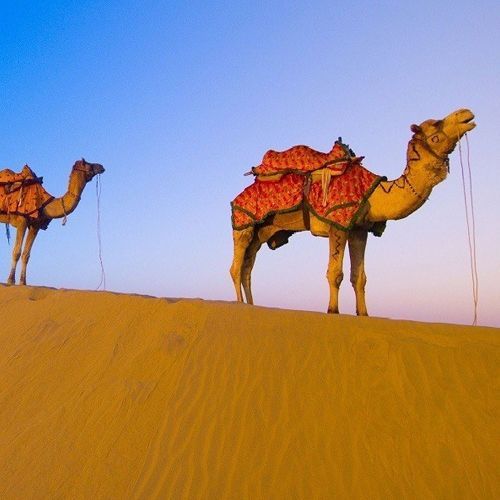
- Location: Approximately 40 kilometers west of Jaisalmer.
- Description: Sam Sand Dunes are one of the most authentic desert dune sites in India. This area provides a spectacular view of the sweeping dunes, with the sunset being particularly breathtaking.
- Activities: Enjoy camel rides, jeep safaris, and even overnight camping. Evening cultural programs featuring folk dances and music are also a major attraction.
- Best Time to Visit: Late afternoon to evening for sunset; overnight stays offer stargazing opportunities.
Khuri Sand Dunes
- Location: Around 50 kilometers southwest of Jaisalmer.
- Description: Khuri is less commercialized compared to Sam and offers a more serene experience. The sand dunes here are surrounded by traditional Rajasthani villages.
- Activities: Camel safaris are popular here, as well as experiencing the rural lifestyle. Many visitors opt to stay in mud huts or thatched cottages, enjoying local cuisine by the campfire.
- Best Time to Visit: Early morning or late afternoon for the best light and temperature.
Lodurva
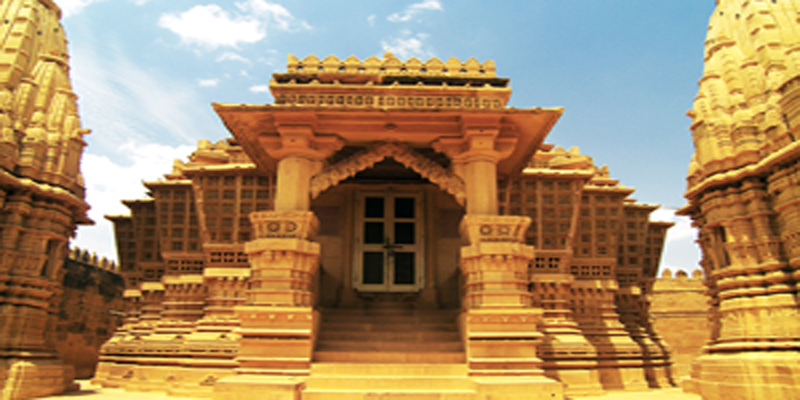
- Location: Approximately 15 kilometers north of Jaisalmer.
- Description: Lodurva is a historical site known for its beautiful Jain temples and architectural ruins. It was once the capital of the Bhati dynasty before Jaisalmer.
- Highlights: The intricately carved Jain temples are the main attractions, along with the Kalptaru, a mythical tree of wish fulfillment.
- Best Time to Visit: Morning to avoid the heat and enjoy the tranquility of the ruins.
Kuldhara Village
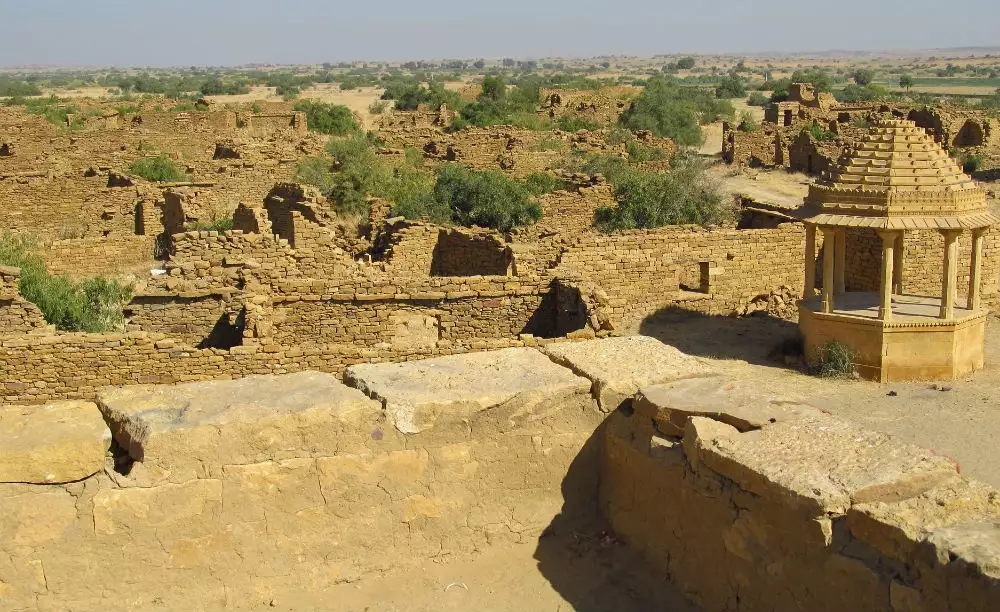
- Location: About 20 kilometers west of Jaisalmer.
- Description: Kuldhara is known as the ‘Ghost Village.’ Abandoned overnight in the early 19th century for mysterious reasons, the village remains well-preserved in its original layout.
- Legend: It is said that the village was home to Paliwal Brahmins, who cursed it so that no one could ever settle there again after they departed.
- Best Time to Visit: Early morning or late afternoon for cooler temperatures and better light for photography.
These excursions provide a diverse experience from natural beauty to ancient history and mysterious legends, making them perfect additions to your Jaisalmer itinerary. Whether you’re riding a camel into the sunset or exploring ancient ruins, each destination offers its own unique charm and adventure.
Itineraries
Jaisalmer, with its rich history, stunning landscapes, and vibrant culture, offers a lot to explore. Here are tailored itineraries for 1-day, 3-day, and week-long stays, ensuring you make the most of your time in this enchanting city.
1-Day Itinerary: The Essentials
- Morning:
- Start with a visit to the Jaisalmer Fort, exploring its palaces, museums, and the Jain temples nestled within its walls.
- Wander through the narrow lanes inside the fort, discovering local craft shops and eateries.
- Afternoon:
- Have lunch at one of the rooftop restaurants overlooking the city.
- Visit Patwon Ki Haveli and Salim Singh Ki Haveli to admire the intricate architecture and historical artifacts.
- Evening:
- Head to Gadisar Lake for a tranquil sunset view.
- Enjoy dinner at a local restaurant, trying out traditional Rajasthani cuisine.
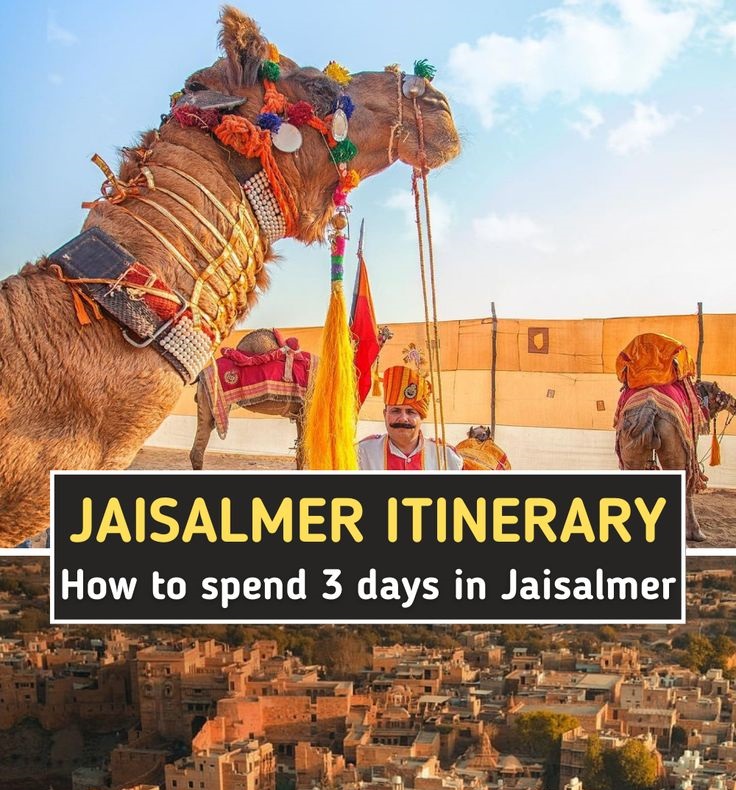
3-Day Itinerary: The Cultural Deep Dive
- Day 1:
- Follow the 1-day itinerary to cover the essential attractions within Jaisalmer.
- Day 2:
- Visit Kuldhara Village in the morning to explore the mysterious ghost village.
- In the afternoon, travel to Lodurva to see the Jain temples and the ruins of the ancient capital.
- Spend the evening at a cultural program in one of the desert camps near Sam Sand Dunes, including dinner and folk performances.
- Day 3:
- Start with a camel safari at Sam Sand Dunes or Khuri Sand Dunes in the morning.
- Return to the city for lunch.
- Spend the afternoon relaxing or shopping in local bazaars like Sadar Bazaar for souvenirs and handicrafts.
- Optionally, join a cooking class or a workshop on Rajasthani arts in the evening.
Week-Long Itinerary: The Comprehensive Exploration
- Days 1-3:
- Follow the 3-day itinerary for an immersive cultural and historical experience.
- Day 4:
- Take a day trip to Tanot Mata Temple and Longewala, a historic border town known for the 1971 Indo-Pak war battle.
- Day 5:
- Explore the Desert National Park to see native wildlife and desert ecosystems.
- Enjoy a night of stargazing if staying in a desert camp.
- Day 6:
- Spend the day visiting nearby artisan villages to observe and participate in pottery making, weaving, or other traditional crafts.
- Return to Jaisalmer for a leisurely evening.
- Day 7:
- Use this day to relax and soak up the city at your own pace.
- Revisit any favorite spots or discover new ones like the local markets or hidden cafes.
- Conclude with a farewell dinner featuring Rajasthani folk music and dance.
These itineraries provide a structured yet flexible approach to exploring Jaisalmer, whether you’re there for a quick visit or a longer, more leisurely stay. Each plan allows for a deep and varied experience of Jaisalmer’s historical landmarks, cultural richness, and stunning natural beauty.
Travel Tips
To ensure a smooth and enjoyable trip to Jaisalmer, here are some essential travel tips covering packing essentials, budgeting advice, and language and communication guidelines.
Packing Essentials
- Clothing: Given Jaisalmer’s desert climate, pack lightweight and breathable clothing for the day and warmer layers for cooler evenings. Include a good hat, sunglasses, and a scarf to protect against the sun and sand.
- Footwear: Comfortable walking shoes are a must for exploring the fort and havelis. Sandals or flip-flops are suitable for more casual outings.
- Sun Protection: High SPF sunscreen, lip balm with SPF, and a wide-brimmed hat are crucial to protect against the strong sun.
- Hydration Supplies: Carry a reusable water bottle to stay hydrated; you can refill it at your hotel or restaurant.
- Flashlight: Handy for night-time excursions or power outages, which can be occasional in remote areas.
- Camera and Binoculars: For capturing the scenic landscapes and potentially spotting wildlife during desert excursions.
Budgeting and Money Matters
- Accommodation: Budget accordingly, as options range from luxury hotels to budget hostels. Booking in advance can often secure better rates.
- Dining: Local eateries and street food are cost-effective and offer a taste of authentic Rajasthani cuisine. Higher-end restaurants are available within hotels and tourist spots but will cost more.
- Tours and Activities: Set aside a portion of your budget for guided tours, especially for desert safaris and cultural performances. Comparing prices between vendors can help manage costs.
- Shopping: Markets in Jaisalmer can be tempting with a variety of crafts. Decide on a spending limit for souvenirs to avoid impulse buys.
- Cash and Cards: While major hotels and shops accept credit cards, carrying some cash is essential for smaller shops and rural areas.
Language and Communication Tips
- Common Phrases: Learning a few basic Hindi phrases can greatly enhance your interaction with locals. For example:
- Namaste (Hello)
- Dhanyavad (Thank you)
- Kitna hua? (How much is this?)
- English Proficiency: English is widely spoken in tourist areas, so communicating should not be a problem. However, older or rural populations may not be as fluent.
- Non-Verbal Communication: Be mindful of local customs. For example, use your right hand for eating and exchanging money as the left is considered unclean.
- Asking for Directions: It’s often helpful to ask for directions from shopkeepers or families rather than individuals on the streets to get more reliable information.
By keeping these travel tips in mind, you can navigate Jaisalmer more comfortably and respectfully, ensuring a memorable experience in this historic desert city.
Sustainable Tourism
Jaisalmer’s beauty lies in its rich culture, historical sites, and the vast Thar Desert. To preserve this beauty for future generations, practicing sustainable tourism is essential. Here are some eco-friendly travel practices and responsible tourism guidelines to follow while visiting Jaisalmer:
Eco-Friendly Travel Practices
- Minimize Waste: Carry a reusable water bottle and avoid single-use plastic products like straws and shopping bags. Dispose of waste responsibly in designated bins.
- Water Conservation: Water is scarce in the desert. Take shorter showers, and be mindful of your water usage at hotels.
- Support Local Businesses: Choose locally-owned hotels, shops, and restaurants. This supports the local community and promotes cultural experiences.
- Respectful Bargaining: Bargaining is expected at markets, but be fair and respectful with vendors.
- Responsible Transportation: Walking, cycling, or using rickshaws are great ways to explore the city and minimize your carbon footprint. Taxis can be helpful for longer distances, but consider sharing rides with others whenever possible.
- Desert Activities: Choose desert camps that prioritize responsible tourism practices. Opt for camel rides offered by responsible camel owners who treat their animals with care. Avoid activities that harm the desert ecosystem, like riding off-road vehicles on sand dunes.
Responsible Tourism Guidelines
- Respect the Culture: Dress modestly, especially when visiting religious sites. Be mindful of local customs and traditions.
- Preserve Heritage: Treat historical sites and monuments with respect. Avoid littering or vandalism.
- Wildlife Viewing: If you encounter wildlife during your desert explorations, maintain a safe distance and avoid disturbing their habitat.
- Support Conservation Efforts: Consider visiting conservancies or parks that work towards protecting the desert ecosystem and its wildlife.
By following these sustainable practices, you can ensure a positive impact on Jaisalmer’s environment and cultural heritage while enjoying a memorable and enriching travel experience. Remember, responsible tourism is a two-way street. While you’re enjoying the beauty of Jaisalmer, the city and its people will appreciate your efforts to conserve its unique charm.
Emergency Contacts
Here are some emergency contacts you might need while visiting Jaisalmer:
Local Police
- Jaisalmer Police Station: Polizeistation Jaisalmer +91-2992-252233
- Emergency Helpline: 100
Medical Services
- Government Hospital Jaisalmer: government hospital Jaisalmer +91 2992250201
- Ambulance Services: There are many private ambulance services in Jaisalmer. You can find their contact information online or ask your hotel for recommendations. Here are some resources that might be helpful:
Tourist Information Centers
- Incredible India Tourist Information Center, Jaisalmer: This is a government-run tourist information center that can provide you with information on Jaisalmer, including maps, brochures, and recommendations for places to visit.
- Contact details might be difficult to find online. It’s best to ask your hotel or check online forums for the latest information.
Additional Tips
- Keep the emergency numbers saved on your phone for easy access in case of an emergency.
- Carry a medical information card especially if you have any pre-existing medical conditions.
- Inform your hotel or tour operator if you are planning any excursions outside the city, especially into the desert.

Best tourist guide for Jaisalmer